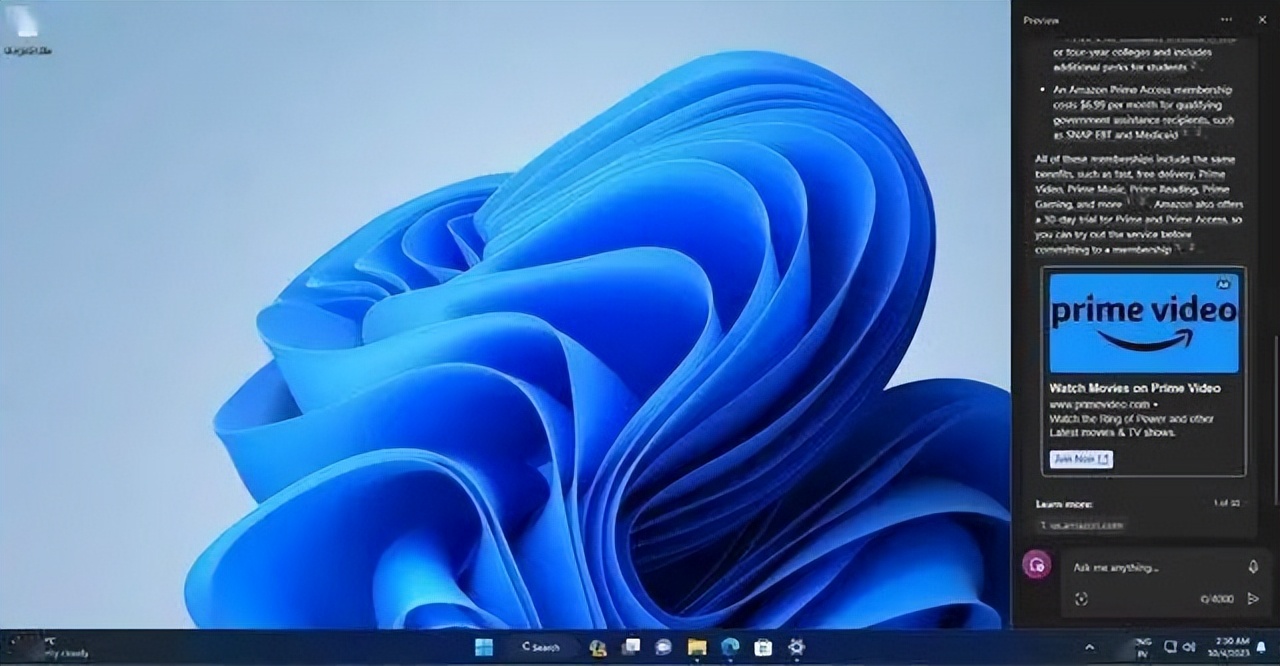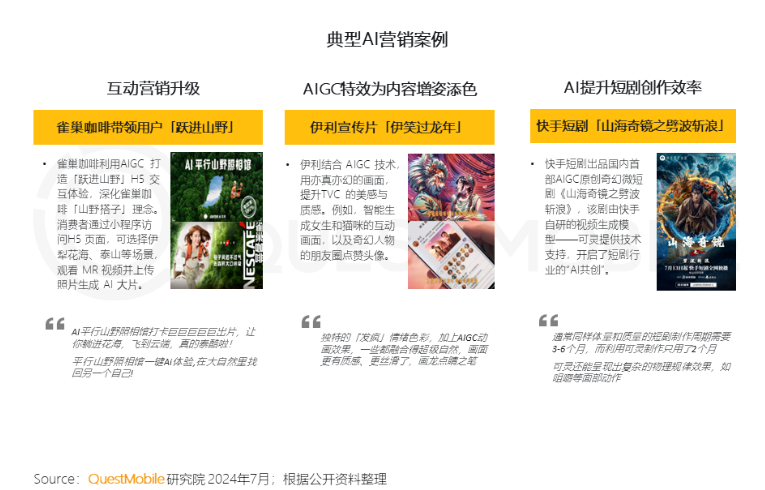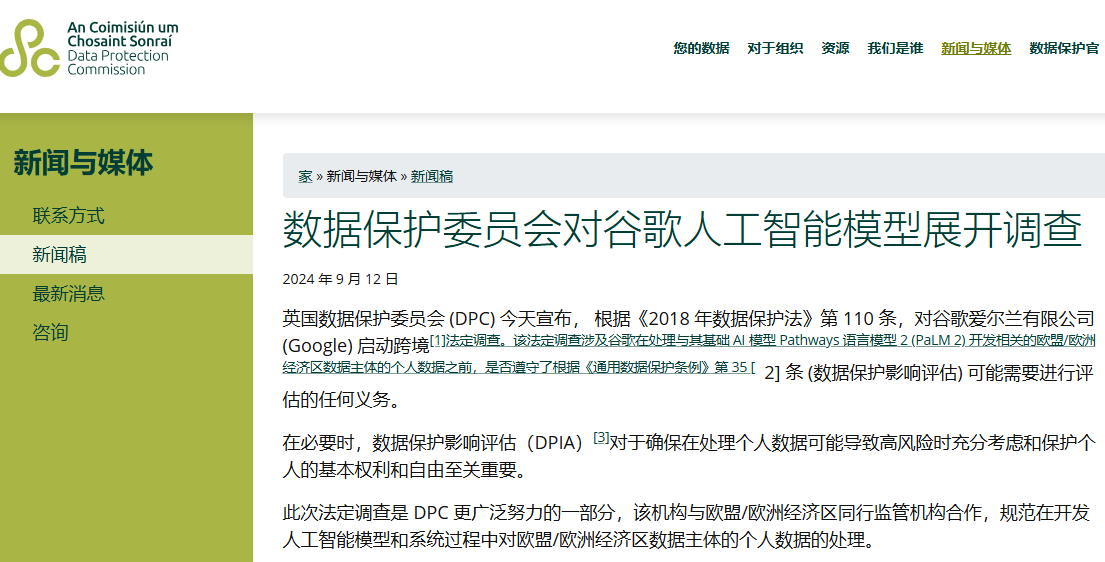AI marketing has allowed tech giants to taste the sweetness of large model commercialization
![]() 11/22 2024
11/22 2024
![]() 527
527
With the advent of a new wave of AI, numerous niche markets have also given rise to tremendous investment opportunities.
For instance, the AI marketing sector has produced the strongest tech stock of the year. As of November 20, the closing price of AppLovin, a leading AI application stock in the U.S. market, had surged by 716.11% year-to-date, far outpacing the gains of NVIDIA during the same period. This is because the company mentioned that AI has continuously improved the AXON advertising engine, making it a crucial catalyst for business growth.
In this regard, a research report by Cinda Securities stated that marketing may be the fastest area for AI commercialization. The surging share price of AppLovin may indirectly confirm that the monetization capabilities of AI marketing far exceed market expectations.
On November 20, Kuaishou, which "firmly implements an AI strategy," released its third-quarter earnings for this year. Online marketing service revenue increased by 20.0% year-on-year to RMB 17.6 billion, achieving over 30% year-on-year growth in marketing expenditure across multiple industries such as media and information, e-commerce, and local living. Kuaishou mentioned that in terms of content production and interaction, AIGC marketing material consumption continued to increase this quarter, with an average daily consumption exceeding 20 million.
Previously, Tencent's third-quarter report also showed that revenue from the marketing services segment was RMB 29.993 billion, a year-on-year increase of 17%. Pony Ma, Chairman and CEO of Tencent, said, "We continue to deploy AI in our products and operations, including marketing services and cloud services, and the tangible benefits it brings are becoming increasingly apparent."
Undoubtedly, major tech companies are accelerating the implementation of large AI models, and online advertising revenue, as the primary profit model for the internet, is becoming the fastest path for large models to transition from 'prospects' to 'profits'.
AI + marketing represents a significant step forward for giants in advancing AIGC commercialization
In October this year, Google's highly anticipated AI Overviews ads officially launched, bringing with them a brand-new advertising format. It is reported that when users conduct specific searches on Google, they may see ads for related products within AI-generated summaries.
Similarly, Microsoft has also introduced advertising within its Copilot chatbot, further blurring the line between content and advertising.

Note: There is currently no option to disable ads in Windows Copilot
Around the same time, mainstream advertising and marketing platforms in China, such as Douyin, Kuaishou, Tencent, Alibaba, and Baidu, were all experimenting with using AI tools in various aspects of marketing.
Cheng Yixiao, founder and CEO of Kuaishou Technology, stated that in the third quarter, Kuaishou continued to optimize the performance of its foundational large model, deepening its applications in content understanding, content recommendation, content production, and user interaction.
It is a consensus among tech giants that AI will reshape business ecosystems. It is no surprise that AI marketing will be one of the earliest areas to see implementation. Online advertising was also one of the earliest businesses to scale during the development of the internet. Even today, advertising revenue accounts for nearly half of the wealth generated by the internet.
As a new general-purpose technology, the development of generative AI still follows the S-curve pattern of innovation diffusion. In terms of commercialization, the earliest and most widespread application in the advertising and marketing sector is an inevitable outcome of the generative AI wave.
This also signals that a multi-billion-yuan racetrack is beckoning large model manufacturers. According to QuestMobile data, the domestic internet advertising market was worth RMB 351.4 billion in the first half of 2024.
The question is, in what aspects and to what extent will AIGC reshape the online advertising market?
"Meticulous calculations" highlight the effectiveness of AI marketing
As the youngest business format on the internet, short video platforms are one of the fastest-changing areas in the online advertising business. Meanwhile, Douyin's monthly active users (MAU) have long exceeded 1 billion, and Kuaishou's MAU exceed 700 million. However, QuestMobile data shows that the overlapping user base of leading short video platforms is only 300 million, and together, they largely cover the majority of internet users.
Therefore, the changes brought about by AI in advertising and marketing can be clearly seen from the development of AI marketing on short video platforms.
Firstly, AIGC further optimizes content production, resulting in significant cost reduction and efficiency enhancement.
In an era of existing user bases, it is exceedingly difficult to produce an incremental financial report. This quarter, Kuaishou delivered a performance report with revenue increasing by 13% year-on-year and profit attributable to shareholders increasing by over 300% year-on-year, largely reflecting the positive impact of large AI models on its commercialization.
After the implementation of AIGC, the cost of performance advertising has dropped significantly, while production efficiency has increased substantially. Previously, Kuaishou stated that the cost of producing a single video ad using a one-stop video editing tool could be reduced from over RMB 200 to RMB 0.47. Meanwhile, ByteDance revealed that relevant tools could increase material production capacity by four times. These figures demonstrate that large AI models effectively empower merchants in content production.
Furthermore, AIGC has gradually become the icing on the cake for advertising creativity, enhancing the effectiveness of advertising dissemination.
With the advent of the era of "rational consumption," users have become less sensitive to commonly used marketing vocabulary, necessitating innovative marketing to capture users' attention. As a result, more and more advertisers are inclined towards performance advertising that emphasizes conversion rates. According to QuestMobile estimates, 80% of advertising expenditures in the first half of 2024 were focused on performance advertising, with the proportion of creative groups for performance advertising and brand advertising being 65.3% and 34.7%, respectively.
This is a key area where AI exerts its influence. Since the beginning of this year, an increasing number of classic cases of AI marketing have emerged, injecting more momentum into platforms and merchants embracing AI marketing. In its third-quarter report, Kuaishou mentioned focusing on native content advertising, including short dramas, Kuaishou mini-games, and novels. Kuaishou has seen significant benefits from refined industry operations, intelligent marketing products, algorithm optimization, and the application of large model technology in marketing recommendation scenarios. For instance, marketing expenditure on short dramas increased by over 300% year-on-year in the third quarter, with a recent peak daily expenditure exceeding RMB 40 million.

Image source: QuestMobile
Previously, after Meta introduced the Advantage+ AI advertising tool suite, an internal study at the company also found that the return on ad spend for advertisers using Advantage+ increased by 32%. AI-driven advertising campaigns allow users to bring products to market faster because they can leverage features such as budget and creative guidance to automate processes.
In summary, whether from the perspective of cost reduction and efficiency enhancement or advertising effectiveness, AI marketing is becoming a required course for advertisers. Tech companies are further lowering the barriers to entry for AI marketing and expanding the application of AI technology in advertising.
In this regard, Mark Zuckerberg once stated, "In the coming years, AI will also be able to generate creatives for advertisers and personalize them based on people's preferences. In the long run, advertisers will basically only need to tell us their business goals and budget, and we'll handle the rest."
Kuaishou also proposed at the Golden Marketing Awards International Creative Festival that its Magnetic Engine marketing science system will utilize large content understanding models to complement its grasp of future market trends, enabling brands to quickly respond and make decisions in a complex and ever-changing market environment.
Undoubtedly, the ambition of tech companies in implementing large AI models in the advertising sector is to cover the entire chain and fundamentally disrupt business models.
Privacy, impact, and the general trend
Marketing insights, market analysis, demographic strategies, creative generation, creative evaluation, and ad placement efficiency... No aspect of marketing will be untouched by AI, and the development prospects of AI marketing are undeniable.
Nevertheless, the potential challenges posed by technological innovation cannot be ignored.
The first is privacy concerns.
The increasing application of AI-generated content in performance advertising has also raised new concerns about copyright and user privacy protection. Regulatory agencies in Europe and other regions are stepping up scrutiny of how tech companies process data for AI training. As two giants that rely heavily on advertising revenue and actively promote the application of AI technology, Meta and Google have become key targets of regulation.
This year, Meta attempted to use public content on Facebook and Instagram to train its large models, but this plan encountered successive setbacks due to opposition from regulators in the UK and Ireland, leading to delays in implementation. Meanwhile, Google is facing an investigation by Ireland's Data Protection Commission (DPC), which focuses on whether its large model, PaLM 2, violates the EU's General Data Protection Regulation (GDPR) when processing personal data.

Meta's recently adopted new learning and modeling technology enables the advertising system to track and correlate users' behavioral sequences before and after seeing ads. This technology is highly valuable for advertisers as it helps them determine the best timing and placement for displaying ads during a single user session. However, balancing user experience and advertising effectiveness warrants further exploration.
The second is the significant impact of AI technology on traditional industries.
The rise of AIGC technology has directly impacted practitioners in the marketing and advertising sector.
As the intelligence of ad placement systems improves, the space and value of manual services gradually diminish. Taking BlueFocus, a well-known domestic marketing technology company, as an example, under the impetus of its "All in AI" strategy, while its business volume has grown rapidly, its workforce has decreased year by year. According to statistics, the number of employees at BlueFocus decreased by nearly half over four years, from 5,058 as of December 31, 2020, to 2,599 by the end of 2023.
In October this year, the company also launched a "human + AI assistant" work mode and even announced an indefinite halt to some outsourcing expenditures to enhance data capabilities and model application capabilities driven by marketing scenarios.
Although businesses that choose AI marketing tools have reduced their demand for human resources, the requirements for advertising talent continue to increase. For example, traditional SEO tools are gradually becoming obsolete, but there is a shortage of new-type SEO talent, providing opportunities for practitioners while also requiring them to continuously improve themselves to adapt to new industry requirements.
Regardless, it is evident from BlueFocus's list of partners that major AI model manufacturers such as Microsoft, Google, Amazon, ByteDance, Baidu, Zhipu, and Dark Side of the Moon are accelerating their influence on the marketing industry. Taking a small glimpse into the bigger picture, large AI models are emerging as game-changers in the field of advertising and marketing.
It is believed that tech giants that have already tasted the "sweetness" of AI marketing will further intensify their efforts in this field in the future, ultimately achieving the popularization of technology, finding incremental growth for the industry, and expanding the "pool."
Source: Hong Kong Stock Research Society







